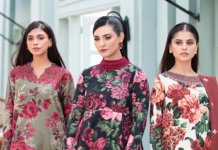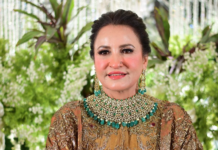A day before International Women’s Day 2021, one of Pakistan’s leading brands launched a campaign to highlight the country’s digital gender gap. An often neglected topic amongst the plethora of issues facing women in Pakistan, the campaign reveals that 50 percent of women do not own a mobile phone, while only 19 percent of women have access to mobile internet.
In today’s digital world, these statistics are woeful. The harrowing bit is that instead of taking notice of these figures, certain individuals on social media attacked the campaign, calling for the authorities to take notice.
Given the mixed response to this campaign, we decided to review it and see whether the brand was wrong in its execution or if the negative response was slightly over the top.
The campaign video starts with what seems like an interrogation room. The interrogator asks the man seated in front of him a set of questions on why he chose to beat his sister. The accused replies, “nahe, uskay pass mobile tha (she owned a mobile phone).” The video then cuts to the stats that we have mentioned above.
Through this campaign, the brand chose to challenge the digital gender gap by not only highlighting the issue, but also provide a solution by offering women free SIMs and a discounted 4G mobile phone.
Reviewing some of the top negative comments, it seems people were upset with the execution more than the message. The Special Assistant to the Prime Minister for Information Dr. Shahbaz Gill led the charge, mentioning that no social stigma is associated with a women’s use of mobile and the ad is not a reflection of our society.

Note to reader: The accused in the campaign video did not ‘kill’ his sister but as the interrogator mentions, “phir behen ko itna kyun mara? (Why did you beat your sister this much?)” –w.r.t Dr. Shahbaz’s tweet that states the video mentions the brother killed the sister for owning a mobile.
Obviously, everyone is entitled to their own opinion. But to state that the campaign is out of sync with reality is a bit of a stretch. In November 2019, a woman was killed in Swat for ‘using a mobile phone’, allegedly by her brother and her brother-in-law. That is just one incident. As per the Human Rights Watch report 2019, violence against women and girls—including rape, honor killings, acid attacks, domestic violence, and forced marriage—remains a serious problem with an estimate that there are about 1,000 “honor” killings every year[1].
But maybe the brand could have made a more grandiose campaign video with elaborate dances and a catchy tune because it seems people are not yet ready to accept reality.

We also had random tweets hinting at all this being an elaborate ‘Yahoodi Sazish’. Because, of course, all is well for women in Pakistan and liberals are out to sabotage this in full force.
The theme for this year’s IWD was #ChooseToChallenge. The idea behind it was that we can choose to challenge and call out gender bias and inequality, and choose to seek out and celebrate women’s achievements. This campaign in question did exactly that; it challenged the patriarchal mindset that chains women in some segments of society to never truly benefit from the technological advancements around them.


But there were some individuals that understood the underlying message the brand aimed to communicate and appreciated it for addressing this societal issue. We might deny it, but many of us have heard of stories in our society, where a woman isn’t ‘allowed’ to own a cellphone or an independent number.
In our opinion, this was one of the few campaigns on IWD that stood out, despite the negativity. We can discuss how it could have been better executed, especially the brand’s decision to provide discounted mobile sets for PKR 1000. But in the end, it is the thought that counts. The campaign managed to ignite a discussion around gender disparity, which goes to show that brands need to stop shying away from asking the tough questions.
Women face countless issues daily. The future belongs to brands that use their platforms and resources to challenge societal norms and tackle gender bias. These brands also need to shake off the stereotypes that have influenced ads and product design for generations. Because, irrespective of what the majority thinks, one can’t ignore the social shift that’s taking place. The younger generations’ attitude towards gender and stereotypes is changing. Keeping in mind Pakistan’s youth bulge, these young consumers cannot be ignored any longer.








































